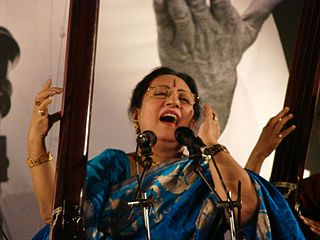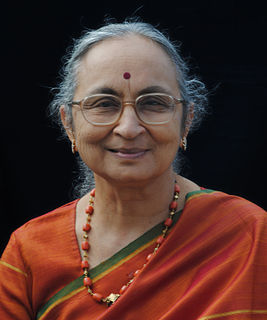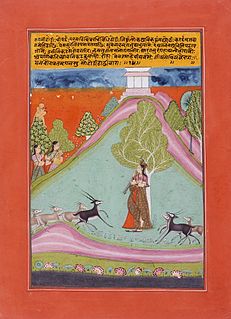A thaat is a "Parent scale" in North Indian or Hindustani music. The concept of the thaat is not exactly equivalent to the western musical scale because the primary function of a thaat is not as a tool for music composition, but rather as a basis for classification of ragas. There isn't necessarily strict compliance between a raga and its parent thaat; a raga said to 'belong' to a certain thaat need not allow all the notes of the thaat, and might allow other notes. Thaats are generally accepted to be heptatonic by definition.

Begum Parveen Sultana is an Indian Hindustani classical singer of the Patiala Gharana.

Kedaram is a rāgam in Carnatic music. It is a derived scale from Shankarabharanam, the 29th Melakarta rāgam.
Kalyani is a melakarta raga in the Carnatic music. It was called Kalyan but is now more popularly called Yaman in Hindustani Music. Its Western equivalent is the Lydian mode.
The Jaipur-Atrauli Gharana is a Hindustani music apprenticeship fraternity (gharana), founded by Alladiya Khan (1855–1946) in the late-19th century.

Mohanam is a rāga in Carnatic music. It is an audava rāga. It is a janya rāga of Harikamboji. However, there are disputes about Mohanam being the janya of Sankharbharanam also because all the swaras present in the Arohana and Avarohana of Mohanam satisfy both the melakartha ragas.
Gandharva Mahavidyalaya New Delhi is an institution established in 1939 to popularize Indian classical music and dance. The Mahavidyalaya (school) came into being to perpetuate the memory of Pandit Vishnu Digambar Paluskar, the great reviver of Hindustani classical music, and to keep up the ideals set down by him. The first Gandharva Mahavidyalaya was established by him on 5 May 1901 at Lahore. The New Delhi school follows the syllabi set by the Akhil Bharatiya Gandharva Mahavidyalaya Mandal.
Yaman is a heptatonic (Sampurna) Indian classical raga of Kalyan Thaat.
Hameer is a nocturnal Hindustani classical raga nominally placed in Kalyan thaat. All the shuddha swaras along with teevra madhyam (F#) are used in it. Generally, its vaadi swar is dhaivat and the samavaadi swar is gandhar. However, some exponents consider the vaadi swar to be pancham as Hamir is mainly sung in the upper half of an octave and is nocturnal."Pancham" is not taken in the "aaroh" but is taken in "avroh".Its jati is "Shadav Sampurn". "vadi Svar" is 'Dhaivat(Dh)' & 'Samvadi Swar' is 'Gandhar

Lalith J. Rao is an Indian classical singer and a representative of the Agra gharana.

Kedar, also known as Kedara, is a Hindustani classical raga. Named after Lord Shiva, the raga is placed a high pedestal in the realms of Indian classical music. It is characterised by a lot of complex turns, which are brilliantly melodious but difficult to express in words.
Yaman Kalyan is a Hindustani classical raga, related to Yaman. The movement of this raga is like Yaman, except that in the descent, it gently touches the flat madhyam using the GmG pattern occasionally.

Mohanakalyani is a rāgam in Carnatic music. It is a janya rāgam from the 65th melakarta scale Mechakalyani. It is a janya scale, as it does not have all the seven swaras in the ascending scale. It is a combination of the pentatonic scale Mohanam and the Melakarta raga scale Kalyani. This ragam has a Prati Madhyamam equivalent of Bilahari, the janya of 29th Melakartha Dheerashankarabharanam. The equivalent of Mohanakalyani in Hindustani music is Bhoop Kalyan or Shuddha Kalyan. Bhoop Kalyan belongs to the Kalyan thaat of Hindustani music. Similar to Mohanakalyani, Bhoop Kalyan is a combination of Bhoop and Kalyan.

Hindol is a Hindustani classical raga.

Pandit Santosh Joshi is an Indian vocalist in the Hindustani classical tradition. He is a member of the Joshi Gharana, which is a branch of the Lucknow tabla gharana). He is known for the khyal form of singing, as well as for his popular renditions of devotional bhajans and Hori. He is the most recent recipient of the Rajiv Ratna Award of Bikaner.
Kalyan is one of the ten basic thaats of Hindustani music from the Indian subcontinent. It is also the name of a raga within this thaat.
Pandit Kushal Das, born in Kolkata in 1959, is an Indian classical sitar and surbahar player.
Marva or Marwa is one of the ten basic thaats of Hindustani music from the Indian subcontinent. It is also the name of a raga within this thaat.
Gaud Sarang is a raga in Hindustani classical music that combines characteristics of Sarang and the now extinct raga named Gaud. Unlike most other members of the Sarang family of ragas, Gaud Sarang is assigned to the Kalyan thaat rather than the usual Kafi.








